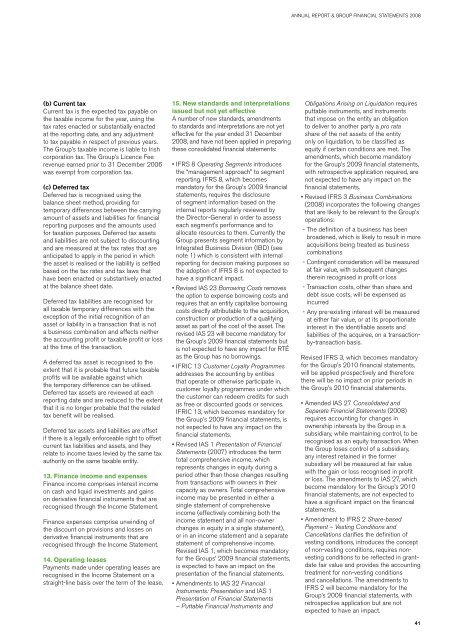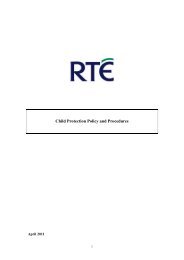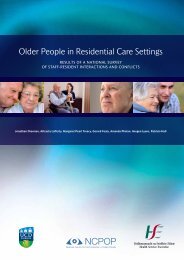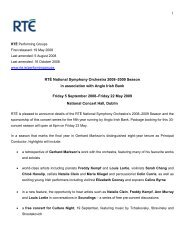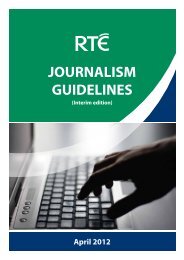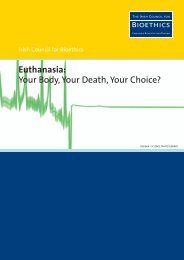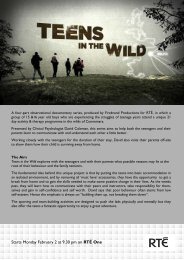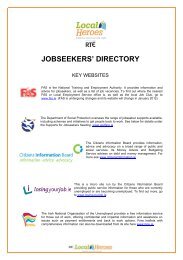Here - RTÃ
Here - RTÃ
Here - RTÃ
You also want an ePaper? Increase the reach of your titles
YUMPU automatically turns print PDFs into web optimized ePapers that Google loves.
ANNUAL REPORT & GROUP FINANCIAL STATEMENTS 2008<br />
(b) Current tax<br />
Current tax is the expected tax payable on<br />
the taxable income for the year, using the<br />
tax rates enacted or substantially enacted<br />
at the reporting date, and any adjustment<br />
to tax payable in respect of previous years.<br />
The Group’s taxable income is liable to Irish<br />
corporation tax. The Group’s Licence Fee<br />
revenue earned prior to 31 December 2006<br />
was exempt from corporation tax.<br />
(c) Deferred tax<br />
Deferred tax is recognised using the<br />
balance sheet method, providing for<br />
temporary differences between the carrying<br />
amount of assets and liabilities for financial<br />
reporting purposes and the amounts used<br />
for taxation purposes. Deferred tax assets<br />
and liabilities are not subject to discounting<br />
and are measured at the tax rates that are<br />
anticipated to apply in the period in which<br />
the asset is realised or the liability is settled<br />
based on the tax rates and tax laws that<br />
have been enacted or substantively enacted<br />
at the balance sheet date.<br />
Deferred tax liabilities are recognised for<br />
all taxable temporary differences with the<br />
exception of the initial recognition of an<br />
asset or liability in a transaction that is not<br />
a business combination and affects neither<br />
the accounting profit or taxable profit or loss<br />
at the time of the transaction.<br />
A deferred tax asset is recognised to the<br />
extent that it is probable that future taxable<br />
profits will be available against which<br />
the temporary difference can be utilised.<br />
Deferred tax assets are reviewed at each<br />
reporting date and are reduced to the extent<br />
that it is no longer probable that the related<br />
tax benefit will be realised.<br />
Deferred tax assets and liabilities are offset<br />
if there is a legally enforceable right to offset<br />
current tax liabilities and assets, and they<br />
relate to income taxes levied by the same tax<br />
authority on the same taxable entity.<br />
13. Finance income and expenses<br />
Finance income comprises interest income<br />
on cash and liquid investments and gains<br />
on derivative financial instruments that are<br />
recognised through the Income Statement.<br />
Finance expenses comprise unwinding of<br />
the discount on provisions and losses on<br />
derivative financial instruments that are<br />
recognised through the Income Statement.<br />
14. Operating leases<br />
Payments made under operating leases are<br />
recognised in the Income Statement on a<br />
straight-line basis over the term of the lease.<br />
15. New standards and interpretations<br />
issued but not yet effective<br />
A number of new standards, amendments<br />
to standards and interpretations are not yet<br />
effective for the year ended 31 December<br />
2008, and have not been applied in preparing<br />
these consolidated financial statements:<br />
• IFRS 8 Operating Segments introduces<br />
the “management approach” to segment<br />
reporting. IFRS 8, which becomes<br />
mandatory for the Group’s 2009 financial<br />
statements, requires the disclosure<br />
of segment information based on the<br />
internal reports regularly reviewed by<br />
the Director-General in order to assess<br />
each segment’s performance and to<br />
allocate resources to them. Currently the<br />
Group presents segment information by<br />
Integrated Business Division (IBD) (see<br />
note 1) which is consistent with internal<br />
reporting for decision making purposes so<br />
the adoption of IFRS 8 is not expected to<br />
have a significant impact.<br />
• Revised IAS 23 Borrowing Costs removes<br />
the option to expense borrowing costs and<br />
requires that an entity capitalise borrowing<br />
costs directly attributable to the acquisition,<br />
construction or production of a qualifying<br />
asset as part of the cost of the asset. The<br />
revised IAS 23 will become mandatory for<br />
the Group’s 2009 financial statements but<br />
is not expected to have any impact for RTÉ<br />
as the Group has no borrowings.<br />
• IFRIC 13 Customer Loyalty Programmes<br />
addresses the accounting by entities<br />
that operate or otherwise participate in,<br />
customer loyalty programmes under which<br />
the customer can redeem credits for such<br />
as free or discounted goods or services.<br />
IFRIC 13, which becomes mandatory for<br />
the Group’s 2009 financial statements, is<br />
not expected to have any impact on the<br />
financial statements.<br />
• Revised IAS 1 Presentation of Financial<br />
Statements (2007) introduces the term<br />
total comprehensive income, which<br />
represents changes in equity during a<br />
period other than those changes resulting<br />
from transactions with owners in their<br />
capacity as owners. Total comprehensive<br />
income may be presented in either a<br />
single statement of comprehensive<br />
income (effectively combining both the<br />
income statement and all non-owner<br />
changes in equity in a single statement),<br />
or in an income statement and a separate<br />
statement of comprehensive income.<br />
Revised IAS 1, which becomes mandatory<br />
for the Groups’ 2009 financial statements,<br />
is expected to have an impact on the<br />
presentation of the financial statements.<br />
• Amendments to IAS 32 Financial<br />
Instruments: Presentation and IAS 1<br />
Presentation of Financial Statements<br />
– Puttable Financial Instruments and<br />
Obligations Arising on Liquidation requires<br />
puttable instruments, and instruments<br />
that impose on the entity an obligation<br />
to deliver to another party a pro rata<br />
share of the net assets of the entity<br />
only on liquidation, to be classified as<br />
equity if certain conditions are met. The<br />
amendments, which become mandatory<br />
for the Group’s 2009 financial statements,<br />
with retrospective application required, are<br />
not expected to have any impact on the<br />
financial statements.<br />
• Revised IFRS 3 Business Combinations<br />
(2008) incorporates the following changes<br />
that are likely to be relevant to the Group’s<br />
operations:<br />
- The definition of a business has been<br />
broadened, which is likely to result in more<br />
acquisitions being treated as business<br />
combinations<br />
- Contingent consideration will be measured<br />
at fair value, with subsequent changes<br />
therein recognised in profit or loss<br />
- Transaction costs, other than share and<br />
debt issue costs, will be expensed as<br />
incurred<br />
- Any pre-existing interest will be measured<br />
at either fair value, or at its proportionate<br />
interest in the identifiable assets and<br />
liabilities of the acquiree, on a transactionby-transaction<br />
basis.<br />
Revised IFRS 3, which becomes mandatory<br />
for the Group’s 2010 financial statements,<br />
will be applied prospectively and therefore<br />
there will be no impact on prior periods in<br />
the Group’s 2010 financial statements.<br />
• Amended IAS 27 Consolidated and<br />
Separate Financial Statements (2008)<br />
requires accounting for changes in<br />
ownership interests by the Group in a<br />
subsidiary, while maintaining control, to be<br />
recognised as an equity transaction. When<br />
the Group loses control of a subsidiary,<br />
any interest retained in the former<br />
subsidiary will be measured at fair value<br />
with the gain or loss recognised in profit<br />
or loss. The amendments to IAS 27, which<br />
become mandatory for the Group’s 2010<br />
financial statements, are not expected to<br />
have a significant impact on the financial<br />
statements.<br />
• Amendment to IFRS 2 Share-based<br />
Payment – Vesting Conditions and<br />
Cancellations clarifies the definition of<br />
vesting conditions, introduces the concept<br />
of non-vesting conditions, requires nonvesting<br />
conditions to be reflected in grantdate<br />
fair value and provides the accounting<br />
treatment for non-vesting conditions<br />
and cancellations. The amendments to<br />
IFRS 2 will become mandatory for the<br />
Group’s 2009 financial statements, with<br />
retrospective application but are not<br />
expected to have an impact.<br />
41


